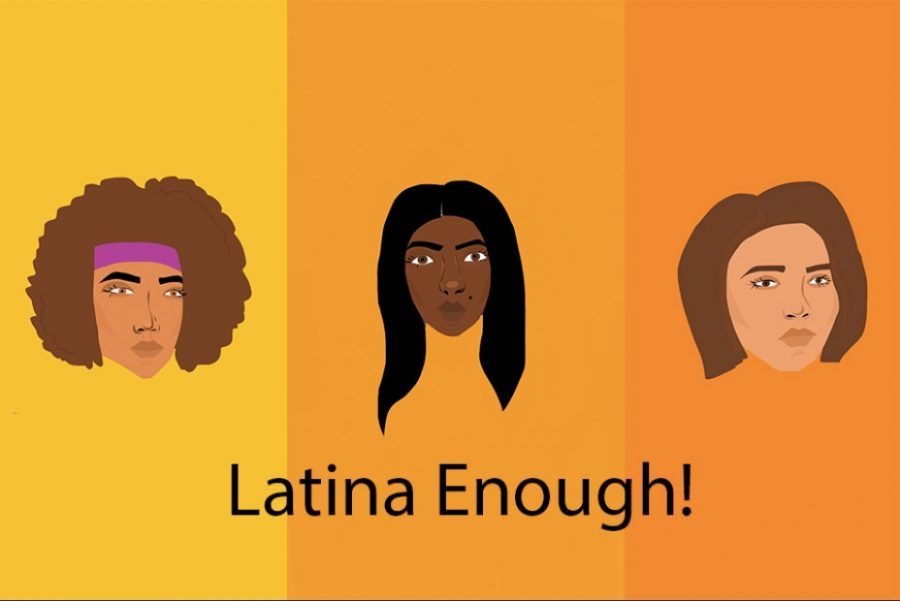Column: We don’t all look like that – reinforced Latina beauty standards are harmful and unrealistic
Photo credit: Leslie Castaneda
An artistic representation demonstrates how Latina beauty can be diverse. Latinas come from many different ethnic backgrounds and should not be forced into one stereotype. Photo illustration by Leslie Castaneda ’20
If you were to Google the word “Latina,” you would probably quickly notice how similar all the women in the images are. You’d see the dramatic curvy body, the bronzed facial complexion, the red pouty lips, the long voluminous hair and the mysterious stare.
This problematic stereotype has been perpetuated in our media and social norms. Take TV shows and movies as an example. A woman who fits the curvaceous and seductive look portrays your average Latina character. She most likely has a thick accent, was someone’s “love interest” — but only temporarily — and tends to be more simple-minded than most of the other characters. When combined with her tight-fitting clothing, you come to perceive the Latina woman as the synonym of sexy, passionate and spicy.
In a piece from 89.3 KPCC, staff members wrote about a study from the USC Annenberg School for Communication and Journalism that found that “less than 5 percent of actors in top Hollywood films are Hispanic, and that Latinas are more likely than women of any other ethnicity to appear partially or totally naked on screen.”
The Latinx community already has very little representation on the big screen. UCLA’s 2018 Hollywood Diversity Report found that only 2.7 percent of roles in films go to people in the Latinx community. For that airtime to be perpetuating the current Latina stereotype is not only degrading to the community as a whole but is personally offensive. The media objectifies Latinas and sets up an unrealistic standard to which other Latinas, like myself, hold themselves to.
To be considered a “good enough” Latina, do I have to be sexualized or “exotic-looking?” Don’t get me wrong. Being sexy and sassy isn’t a bad thing. You do you, girl.
However, when society forces a whole group of people — people who all look very different, might I add — into one mold, there are going to be all types of problems. Katherine Garcia, a writer for Everyday Feminism Magazine, wrote an incredible article on this stereotype, describing it as “the clumping of all Latinas into one massive bowl of sameness doused with way too much extra spicy hot sauce.”
Not all Latinas come from the same place. Not all Latinas are born with the “ideal” physical features. Not all Latinas are as “European mixed with spicy” as Western culture may want.
These pervasive stereotypes leave no room for individuality and send an awful message to Latinas. As a Latina myself, I remember staring into a mirror at the age of 10, trying to comprehend why my breasts weren’t as big as the women in my mom’s telenovelas. I wondered, “Why am I so thin? What would I look like if had a little more here and there? Why is my skin so pale?” In my young eyes, I thought those were the things I needed to be considered beautiful, to be the Latina that society wanted me to be.
Now that I’m older, I’m more educated on these topics and understand that I look completely fine, but every once in a while those insecurities sneak back into my head. They’re so ingrained that when I cut off a good 12 inches of my hair earlier this year, a part of me regretted it because I felt like I had cut off one of the only things that made me “look Latina.”
“Latina” is such a broad term that to expect all the women who identify as Latina to look one way is both ridiculous and unrealistic. Not all Latinas look like Sofia Vergara, Jennifer Lopez or Eva Mendes.
As Garcia puts it, these women are all gorgeous, but they aren’t exactly the most accurate representation of what Latinas as a whole look like.
“I’m not saying there is anything wrong with being any of these things, as long as you are happy and don’t feel you are betraying your own identity. But, unfortunately, it’s not like that at all for entirely too many of us,” Garcia wrote.
She goes on to end the piece with an empowering message about being confident and beautiful for yourself, not to prove something to the dominant culture.
“The spicy Latina stereotype is f***** up for so many reasons, but the saddest part is that everyone else thinks they have the authority to decide if you are Latina enough for them. Truth is, I am Latina enough for me, and I don’t need anyone’s permission to be,” Garcia wrote.
I work towards being beautiful for myself and in my own way, not for anyone else.

Celeste Ramirez joined the Oracle as a columnist in 2017 and is now the Multimedia Editor. Her column focuses on diversity at Archer, highlighting the...













Maya Wernick • Oct 17, 2018 at 6:07 pm
Excellent piece, Celeste! I am so glad you decided to write this and were able to so candidly share your experiences with these harmful stereotypes. Keep up the good work